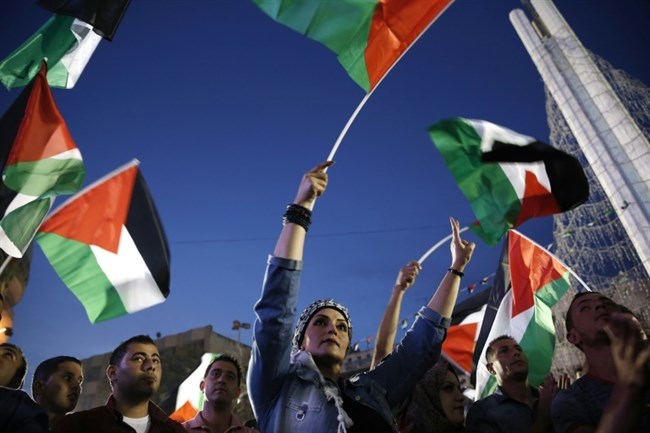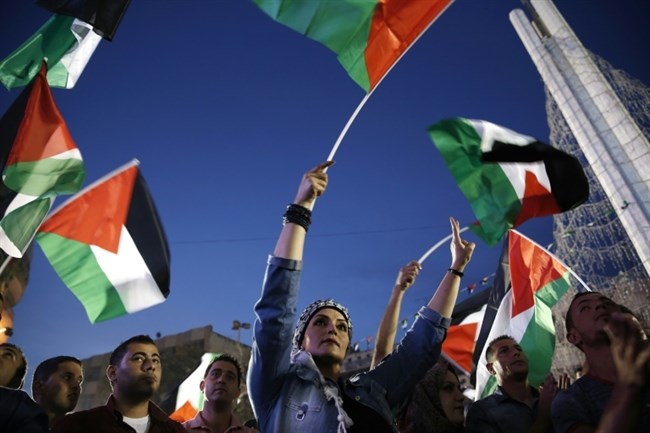By Aimee Shalan | al-Shabakah | (Ma’an News Agency) | – –
Current British Complicity
It is not only corporate entities such as G4S in the case of Dareen Tatour that are infringing on free speech on Israel’s behalf. At a time when international pressure on Israel is increasing, the UK government and a number of British institutions are moving in the opposite direction, deepening their support for a Zionist ideology bent on repressing Palestinian culture and history.
Efforts to freeze the funding of arts groups and productions deemed “pro-Palestinian” by Israel’s Culture Minister Miri Regev follow on the heels of 2011’s “Nakba law,” which enables the withholding of funds to public institutions deemed to be involved in challenging the founding of Israel or any activity “denying the existence of Israel as a Jewish and democratic state.” This draconian law appears to have provided a template for the UK government to start censoring cultural voices in Britain that critique the state of Israel.

This development came to light in August 2014, when London’s Tricycle Theater refused to host the UK Jewish Film Festival (UKJFF) while it was partially funded by the Israeli embassy — a response to the loss of life resulting from Israel’s bombardment of Gaza. Although the Tricycle offered to provide alternative funding to cover the cost of the contribution from the Israeli embassy, the UKJFF was unwilling to decline embassy sponsorship and withdrew its festival from the theater.
The Tricycle came under sustained attack and was soon subject to an intervention from the then-secretary of state for culture, Sajid Javid. Together with the minister for culture and the digital economy, Ed Vaizey, Javid worked closely with the Israeli ambassador at the time, Daniel Taub, to pressure the Tricycle to withdraw its objections to Israeli embassy funds. Unable to stand fast against threats to its own funding, the small venue withdrew its objection and invited the UKJFF back on the same terms as the previous year.
While attending an event organized by the Board of Deputies of British Jews in 2015, Javid noted that his intervention the year before was also intended to deter other organizations from exercising their right to boycott. “I have made it absolutely clear what might happen to [the theater’s] funding if they try, or if anyone tries, that kind of thing again,” he said.
Javid’s message rang loud and clear: Any boycott of Israel by British cultural institutions is out of bounds if they wish to receive funding. Israel’s policies and practices are no longer simply being ignored by UK ministers; now they are being adopted.
The Tricycle’s stance, while short-lived, nevertheless marked the beginning of a public debate about threats from pro-Israel government advocates to the independence of cultural institutions in the UK. In October 2014, a public discussion entitled “After the Tricycle: Can Arts Organizations Say ‘No’ to Embassy Funding?” was held at Amnesty International Action Center. During the discussion the need for effective strategies to contest political pressure on the arts became more apparent as other instances of institutional censorship and manipulation were reported.
One example cited was the April 2014 decision by the Donmar Warehouse, a theater located in London’s West End, to censor a podcast that was part of a discussion series that accompanied Peter Gill’s production of “Versailles.” Entitled “Impossible Conversations,” the series featured leading political and cultural commentators exploring the legacy of World War I. Twenty-four hours prior to one of the discussions — “Mr. Balfour’s Letter to Lord Rothschild: How the Great War Remapped the World” — the Donmar Warehouse received a complaint from a funder claiming that the event was an attack on the state of Israel, an anti-Israel rally, and anti-Semitic. Threats to withdraw funding accompanied the complaint, as well as a pledge to raise grievances with publicly funded cultural institutions at which the event’s programmer worked or served as a trustee. Although the Donmar Warehouse held the discussion, it chose not to post the podcast online along with the other discussions that took place.
Institutional and government censorship in support of Israel has also entered the academic sphere. In 2015, Eric Pickles, then secretary of state for communities and local government, ensured the cancellation of an academic conference on the legal status of the state of Israel at the University of Southampton. The conference included both an Israeli law professor and a Palestinian human rights activist, but Pickles claimed that the event would give voice to “the far-left’s bashing of Israel, which often descends into anti-Semitism,” rather than offer “a platform to all sides of the debate.” Michael Gove, then chief whip, joined the fray, declaring that “[i]t was not a conference, it was an anti-Israel hate-fest.”
In response to the government’s intervention, the university withdrew permission for the conference to be held on its property on health and safety grounds. The university claimed that the event could give rise to protests and that it did not have the resources to mitigate this risk, despite a statement from the police confirming they could ensure the security of the event. In April 2016, the conference was blocked for a second year when organizers were not able to pay the 24,000 ($29,000) the university required of them to cover the cost of hiring private security and erecting fencing.
Britain’s increasing involvement in the cultural repression of Palestinians is also occurring through the denial of UK visas. Arts, culture, and education help create spaces in which difficult problems can be addressed creatively — especially when people from different backgrounds and contexts are brought together in them. This is why cultural and educational exchanges between Palestinian and international artists and academics have been blocked by Israel’s occupation regime for decades. Most recently, Israel banned UK academic Dr. Adam Hanieh from entering Israel or Palestine for 10 years after he attempted to travel to Birzeit University to deliver a series of lectures. Israel also refused entry to the UK-based Palestinian writer Ahmed Masoud to participate in the Palestinian Festival of Literature in the West Bank earlier this year.
Lately, an increasing number of reports have also emerged regarding the denial of visas by UK authorities to Palestinian artists and academics seeking to come to Britain to participate in exhibitions, theater productions, speaking tours, and conferences. Hamde Abu Rahma, a Palestinian photojournalist, was twice denied a UK visa despite financial backing and support from a number of British MPs before he was finally granted permission to come to Scotland for this year’s Edinburgh Festival. Other Palestinian artists whose denied visas have been made public in recent years include Ali Abukhattab and Samah al-Sheikh, writers who were due to appear at the Institute of Contemporary Arts as part of the Shubbak festival, and Nabil al-Raee, artistic director of the Jenin Freedom Theater who was supposed to speak at a number of UK events.
The UK visa system is also becoming more of an obstacle to developing academic partnerships with Palestinian universities. Because it is extremely difficult to obtain clear information about the visa process, institutions’ ability to work collaboratively is hindered. Palestinian academics and students alike are being denied entry. According to the British Council, this year for the first time five out of ten of their sponsored Palestinian students were refused visas.
Arts and education organizations have largely been dealing with such access issues individually, in the hope of reaching a solution by working quietly with the UK authorities on a case-by-case basis. Israeli artists and academics, however, are not subject to the same restrictions, even if they come from illegal settlements in the West Bank. While an Israeli settler can simply obtain a visa on arrival in the UK, a Palestinian living down the road must go through an expensive and complicated application process before they travel, with dwindling hopes of success.
It is essential that British institutions are not discouraged from inviting Palestinians to participate in their activities, especially while the UK government cracks down on the cultural boycott and stifles academic debate under the guise of ensuring a platform for “all sides.”
Promoting Palestinian Cultural Production
Changing attitudes and practices in the UK toward Palestinian culture and identity, which have been relegated to an inferior role ever since the days of Balfour, is no easy task. There is, however, much that Palestinian civil society and solidarity groups are doing, and can do more of, in the run-up to the centenary of the Balfour Declaration to create conditions to put an end to British complicity in the censorship of Palestinians and to the UK government’s prejudicial policies in support of Israel.
Organized public pressure is a key element in creating such conditions. The Palestinian poet Dareen Tatour’s imprisonment has received increasing international attention and the support of over 250 renowned writers, poets, translators, editors, artists, public intellectuals, and cultural workers. Tatour believes this international response could influence the final outcome of her case. “Public pressure,” she says, “may force the Israeli authorities to reconsider the persecution of Palestinian artists, writers, and young activists just because they express their rejection of oppression.” As such, Palestinian civil society and solidarity groups can work jointly to increase international pressure for the release of Tatour and work to intensify the Stop G4S campaign in solidarity with all Palestinian political prisoners.
More generally, these groups can also:
– Use the media, public forums, and other outreach to increase understanding of the Balfour Declaration’s devastating impact on the Palestinian people through its negation of Palestinian culture and identity and keep calling on the UK government to issue an official apology;
– Coordinate a creative public communications campaign focusing on Israel’s attacks on Palestinian culture and history and on the legitimacy of Palestinian civil society’s call for the cultural and academic boycott of Israel until it complies with international law;
– Provide legal and other support to artists, academics, and cultural programmers facing political pressure from pro-Israel advocates and coordinate activities to stop UK ministers from threatening the independence of British cultural and academic institutions;
– Create a comprehensive database documenting cases of denied British visas for Palestinians over the past five years to put pressure on the British authorities to treat Palestinians no differently from Israelis when they apply to come to the UK.
Nearly 100 years after Balfour, one thing is certain: It is time for Britain to adopt a new approach. The centenary presents an opportunity for the UK not only to cease aiding Israel in its bid to silence Palestinians and stonewall cultural exchange, but to actively promote Palestinian cultural production and ensure that Palestinian stories are being told.
An extremely well-coordinated campaign is required, however, to ensure that sufficient public pressure is put on the UK government to finally acknowledge the devastating impact of its historic intervention and begin to make reparations for its past and present complicity in the cultural repression and ongoing dispossession of Palestinians.
Originally published in full on Al-Shabaka’s website on October 26, 2016.
The views expressed in this article are the authors’ and do not necessarily reflect Ma’an News Agency’s and Informed Comment’s editorial policy.
Al-Shabaka is an independent non-profit organization whose mission is to educate and foster public debate on Palestinian human rights and self-determination within the framework of international law.
In this Al-Shabaka policy brief, Aimee Shalan analyzes the legacy of the Balfour Declaration on Palestinian-British relations in the occupied Palestinian territory and the United Kingdom, particularly regarding the repressing of Palestinian cultural voices. The first part of this brief was published on Friday.



 © 2026 All Rights Reserved
© 2026 All Rights Reserved